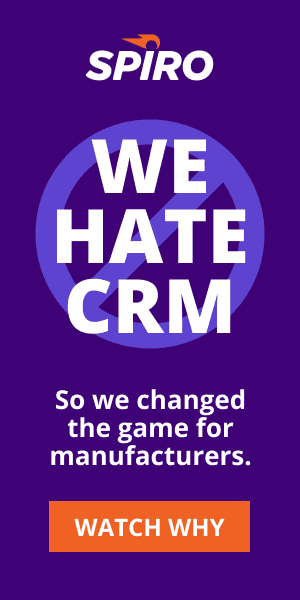5 Small Tweaks That Can Make the Difference Between a Lost and a Closed Deal
Salespeople are always looking for an edge, whether it’s a software (like Spiro) which allows you to focus on selling instead of data entry, or sales techniques that can help bring out the best in you by adjusting your approach — if it can boost your performance, then ambitious salespeople are usually willing to give it a try.
But oftentimes, it’s the little things that can make a big difference, especially for salespeople who have developed habits and a process which can be difficult to upend. This is why it’s the little things that can make the biggest difference; after all, unless you’ve been trained extremely poorly, you’re probably already doing all the things you should be, even if you might occasionally forget a few of them.
So instead of worrying about technique, or your specific selling style, oftentimes, all you need to do is tweak a few small things to help you improve your performance and close more deals. The following are five examples of small things you can do today that can have a measurable impact. Try them out for yourself.
1. Shorten your meetings
It might seem counterintuitive, but shortening meetings can increase your productivity by allowing you to have more contacts and helping you make better use of your time. One quick way to do this is by putting a hard stop on meetings and making sure you stick to it. Whenever you shorten meetings, you’ll be forced to make better use of your time, which can help you avoid pointless, meandering discussions which serve no purpose. Sometimes, in order to speed up, you need to take a step back and slow things down.
2. Make one more call
Sales trainer Jeb Blount coined this little bit of sales advice, and it’s a simple enough tweak that can have a measurable impact. Here’s how it works: before leaving for the night (or before ending your prospecting blitz), make one more call. It might sound silly and unimportant, but you’d be surprised at just how impactful this little exercise can be. Not only does it give you one more opportunity at a deal (and these opportunities can add up over time), but it can also help you develop your self-discipline, which can spill over into other aspects of your job.
3. Confirm your appointments
This is one small tweak that can go a long way to building trust with your prospects. Instead of assuming a previously scheduled meeting is taking place, make it a habit to reach out and confirm the meeting beforehand. Not only will you reduce your no-shows, but you’ll remind a prospect of a meeting they might have otherwise forgotten, and, perhaps more importantly, will position yourself as a competent professional who pays attention to detail, which can set you apart from your competition. Again, it’s a small detail, but it has a disproportionate impact.
4. Mirror your prospect
Mirroring is when you scan and subtly replicate the physical and verbal behaviors of a prospect in order to help build rapport. At first glance, it might seem like a cheap trick, but it’s actually an effective way to make people feel comfortable with you, as long as you don’t overdo it, of course. When mirroring, don’t take it too far. Instead, try to focus on a prospect’s energy and speaking cadence. If they’re high-energy and want to talk fast, try doing the same. If, however, they’re more thoughtful and methodical in their speech, mirror them instead of overwhelming them with energy. It’s a great way to make people feel comfortable, so they can focus more on what you’re saying and less on how you’re saying it.
5. Never say anything you don’t intend to do, no matter how small
Many salespeople assume that if they mention they’re going to do something in passing, a prospect is unlikely to hold them to it, and even more likely to forget. For instance, if a sales rep promises to get back to a prospect with a small detail about a product, some sales reps are perfectly comfortable blowing it off, since they see it as an unimportant detail that the prospect is unlikely to remember. In reality, prospects notice a lot more than they might let on, and will almost certainly remember that a sales rep promised something but failed to keep their promise, no matter how small. That’s why a great rule of thumb is to never, ever say you’ll do something you don’t intend to do. It’s a small tweak to your approach, but it can have a measurable impact. Prospects trust people who keep their word, especially when it comes to the smaller things, so make sure you never make a promise you don’t intend to keep.

